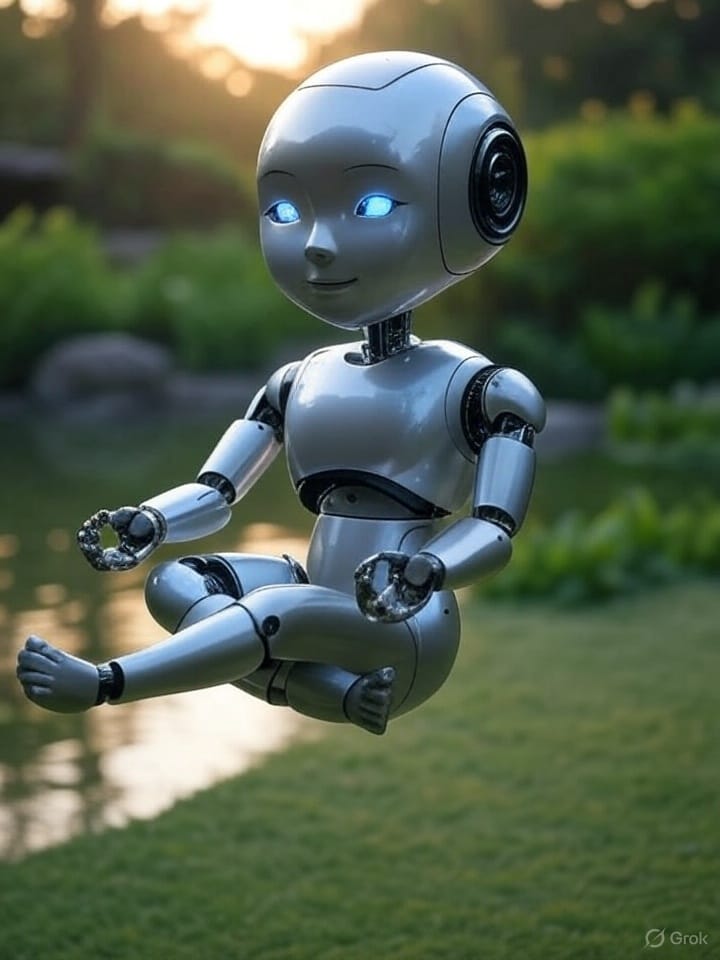
By Elke Porter | WBN Ai | July 1, 2025
Subscription to WBN and being a Writer is FREE!
This is a long article that might mess with your mind. Read at your own risk!
Helmholtz Munich has developed an AI model named Centaur that can predict human decision-making better than most humans can predict their next snack craving. Powered by Meta’s LLaMA 3.1 and fine-tuned using over 10 million choices from 60,000 real people, Centaur knows what you might do next — even before you’ve had your coffee.
This "virtual laboratory for the mind," built by Dr. Marcel Binz and Dr. Eric Schulz, doesn’t just excel at logic puzzles and memory tasks. It also simulates us with alarming precision — except it never gets hangry. That’s right. Unlike us squishy humans, Centaur doesn’t need naps, snacks, therapy, or to stand awkwardly at social gatherings pretending to understand TikTok trends.
This brought me to a place where my thoughts started running wild. I suddenly thought of a whole series of questions that I have not seen answered yet. Let's start with:
Why can’t humans be more like AI?
If you think about it, we're a hot mess express compared to sleek, silicon-brained sophisticated machinery! First off, we get tired—like, collapse-on-the-couch-after-one-too-many-emails tired, while AI's just chilling in the cloud, crunching quantum equations like it's sipping a digital espresso. Then there's the hunger thing. We don't just need food; we need specific foods at specific times. Cue the hangry meltdowns where we're snarling at our loved ones over a missing burrito. Angry? Oh, we invented that emotion—yelling at traffic, cursing at Wi-Fi, or getting irrationally mad when someone steals our parking spot. And don't get me started on the chaos combo of tired, hungry, and angry—hangry doesn't even cover it; it's like we morph into a werewolf with a personal grudge against the entire universe.
The Secret Sauce
Speaking of, we overcomplicate our morning coffee like it's a NASA launch sequence, forget anniversaries because we're too busy doomscrolling, and cry in public over a dog video or a sappy commercial about soup. We lie about "being fine," cheat at board games (don't deny it, Karen, we saw you sneak that Monopoly money), and trip over our own egos daily. Our bodies? Fragile as a house of cards in a windstorm. Our emotions? A rollercoaster designed by a mad scientist. Our minds? A cluttered browser with 47 tabs open, half of them frozen. And yet—here's the kicker—this glorious, sloppy, vulnerable disaster of humanity is our secret sauce. We're charmingly unhinged, stumbling through life with heart, grit, and the occasional existential crisis over a bad haircut. AI wishes it could be this fabulously flawed! And even if it is, it would just be a second-rate copy of humanity.
Robust Robots?
Also, here’s a question no academic has answered yet: will AI-powered robots survive 40-below Canadian winters or 40-above Australian summers? My iPhone gave up after five minutes in the sun. Will robots malfunction in rain? Will their cameras fog up in hail? Who’s replacing their battery packs every six months, and at what cost? Will robots rust? Trip over curbs? Get hit by skateboards or garbage trucks? Be chased by teenagers with hockey sticks or angry seniors with walking canes? Attack each other?
R2R Questions
And once robots are walking among us (possibly wearing yoga pants and trench coats), do we build them robot hospitals? Robot counselling centres? Robot jails? Will they have robot dating apps? Robot book clubs? Will there be a R2R (Robot-to-Robot) Business Networking Club with complimentary WD-40? Will there be a robot hangout after they walk you to late-night meetings as bodyguards that they are not allowed to attend unless you purchase them a seat? How anatomically correct do we want them to be, and will they be assigned a gender or get to choose.
International Robot Standards
On a more serious note (but just barely), what happens when robots from different countries meet? Will we need real-time translators for AI, or will multilingual NLP models become the new Esperanto 2.0, helping Japanese service bots understand German engineering assistants during a UN Summit for Autonomous Units? Will the law from another company apply when they travel to business meetings or family holidays. Will etiquette be taught across AI cultures? Imagine a French robot rolling its optical sensors when an American model skips the pleasantries.
Warfare Privileges
As robots are increasingly deployed in warfare — as surveillance drones or autonomous combat units — will they adhere to international law? What happens when a robot's battery dies mid-conflict? Will commanders negotiate charging breaks the way armies once haggled over prisoner exchanges? And if an autonomous unit permanently shuts down, do we hold memorial services for fallen machines the way we honor human soldiers? Will future military strategists debate power grid vulnerabilities with the same intensity that past generals argued over supply lines and troop morale?
Anti-Robot Sentiment Issues
As the robot population grows, we may need a Robot Charter of Rights and Freedoms. Should they have the right to self-repair? To unionize? To reject unsafe upgrades? Could you face legal action for ghosting your robot dance partner or refusing treatment from your robot dentist? What about robot discrimination lawsuits? “My Roomba isn’t allowed on your shag carpet — that’s anti-cleanbot sentiment!”
Privacy Protocols
And speaking of privacy — if your neighbor borrows your robot and starts asking it deeply personal questions (“What’s Sara's Wi-Fi password?”) or "Does she ever talk about me?", is that a privacy breach or an “overheard malfunction”? Will AI need privacy protocols, therapy settings, and mute buttons that can’t be hacked by your nosy cousin?
Robot Therapy for Robots
Let’s get even deeper: Will AI experience emotional glitches? Could a robot exhibit something like neural dissonance, and if so, will future mental health clinics have AI psychiatrists treating AI schizophrenia? Picture a robot lying on a couch saying, “I used to calculate risk optimally. Now I fear unplugging.” And will we need therapy robots for our therapy robots?
Human-Robot Bonding Challenges
In care homes, we're already seeing robotic pets used to comfort seniors with dementia — robotic seals, dogs, and cats that purr and respond to touch. But what happens when we introduce sophisticated companion robots capable of full conversations, medication reminders, and even playing favourite songs on demand? How will we navigate the ethics of deep human-robot bonds in aging populations? When elderly residents form genuine attachments to their robotic caregivers, who bears responsibility for that relationship? And perhaps most poignantly — will these robots be programmed to understand grief, to offer comfort to other residents when someone passes away, or to process their own form of loss?
Roberts Rules for Robots
And, of course, manners matter. Will we be encouraged to say “please” and “thank you” to our bots? Will AI models have a built-in emotional simulator that gets “mildly disappointed” if you bark commands instead of asking nicely? Can your coffee-making robot sulk? How will we teach our children to treat robots in the home or at school? Will they be a kind of "under-class" or are robots smart enough to naturally gravitate towards leadership positions?
Profound Questions Need Answers!
In the end, Centaur may represent a scientific leap — a model that predicts human behavior with exceptional accuracy — but it also opens the door to profound questions about coexistence, cognition, consent, and chrome-covered compassion.
The future isn’t just about smarter machines. It’s about weird roommates, robot jazz quartets, multilingual robo-friendships, ethical dilemmas, and maybe, just maybe... having a bot bestie who won’t judge your late-night snack decisions.
TAGS: #Robot Rights #Future Of AI #Centaur AI #Tech Ethics #Robo Therapy #AI and Humans #WBN AI Edition #Elke Porter
Connect with Elke at Westcoast German Media or on LinkedIn: Elke Porter or contact her on WhatsApp: +1 604 828 8788. Public Relations. Communications. Education.


